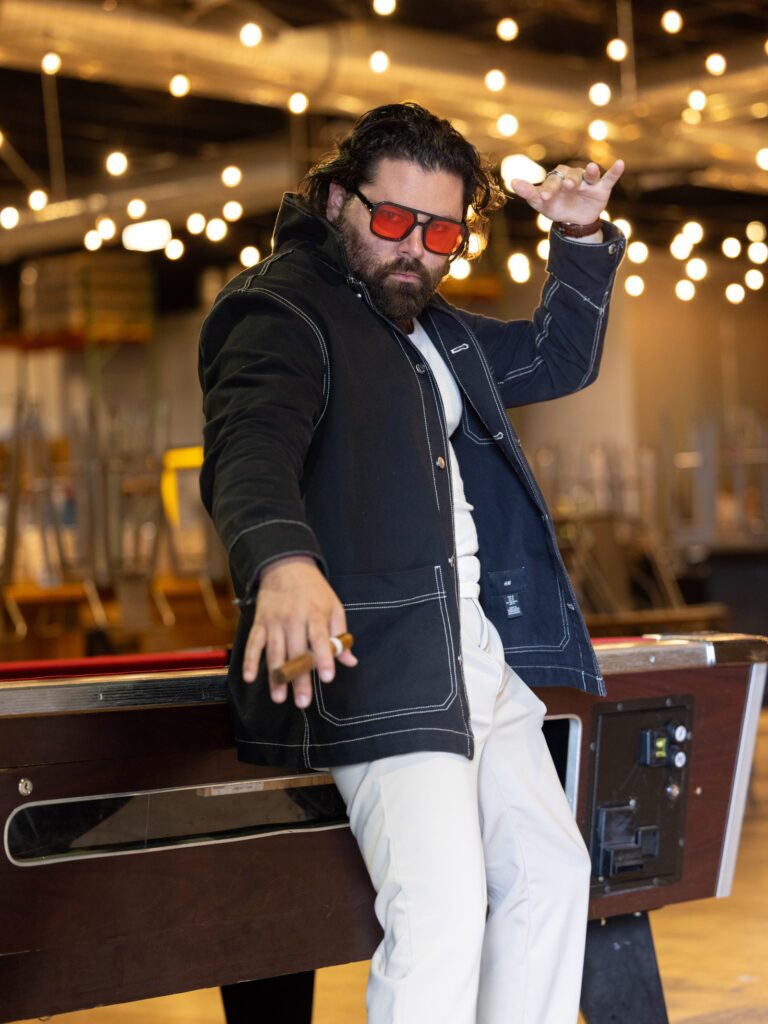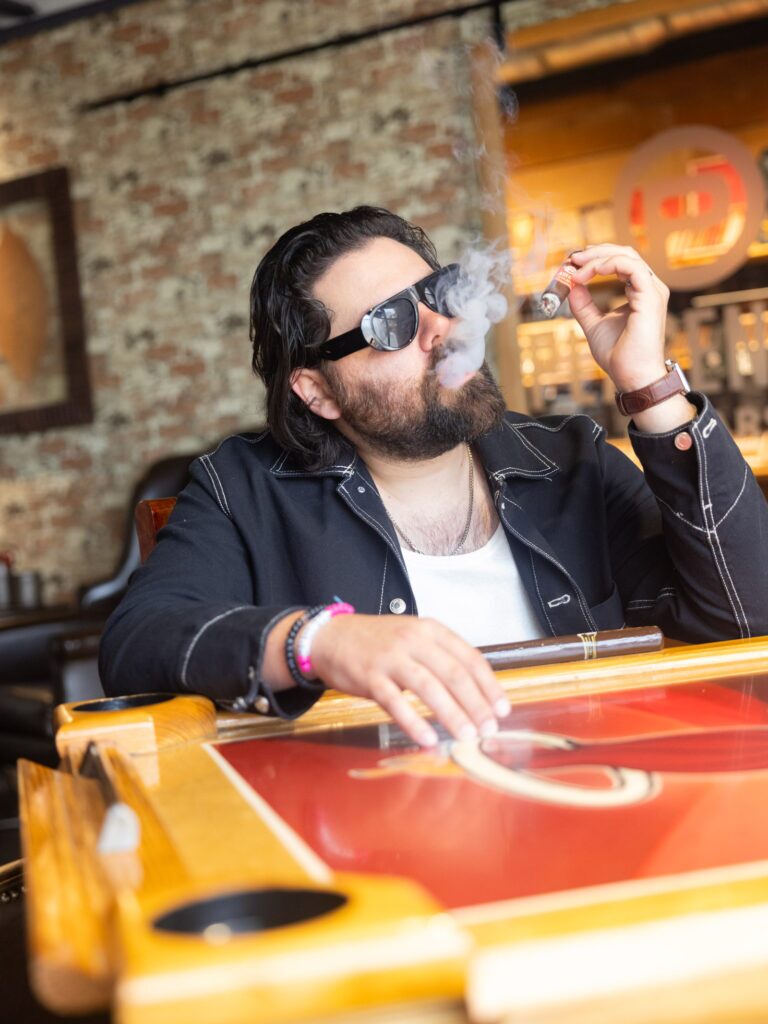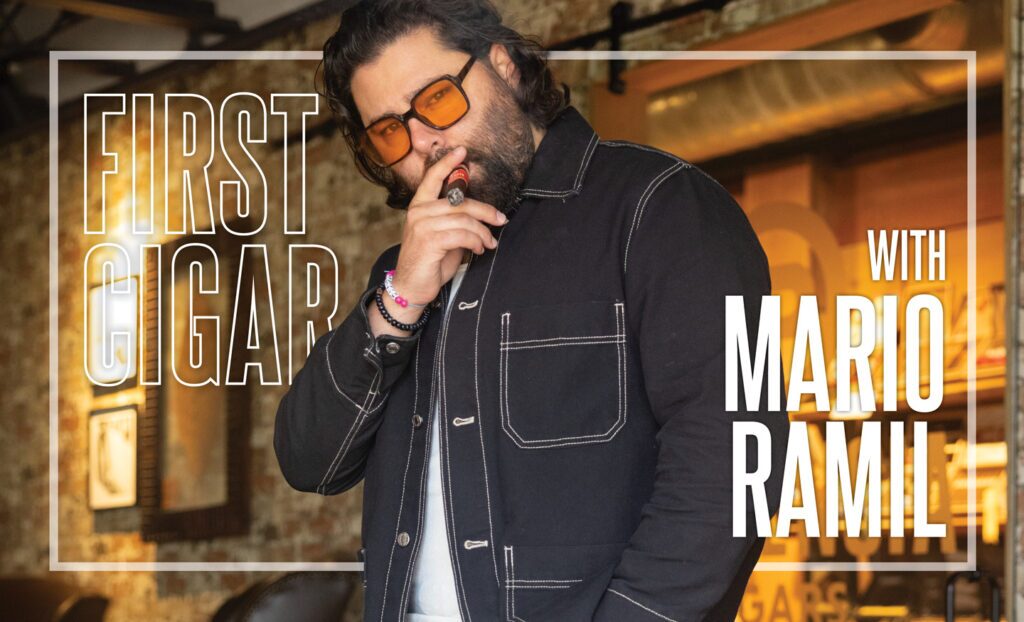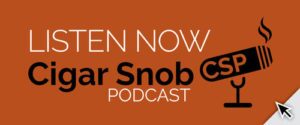Cuban-American comedian Mario Ramil has built a devoted following through his character sketches and live shows. Ramil is also a content creator, an experimental musician, a drama class denizen and an all around entertainer. He started his adult life with a day job with the Florida State Attorney’s office, ditching that eventually to start a Miami-based artist’s hub called XQUME Miami, drawing local creatives of all stripes to give them some recognition. He also became a touring comedian, leaning heavily into his personal experiences and the Cuban community for material. At the same time, he created recognizable characters that include the Cuban-Doctor, and Rodrigo the Weatherman. Like a lot of us, he began his cigar journey with the cheap stuff. But today he’s a knowledgeable smoker. We talked with Ramil about his journey. And yes, we laughed; he’s a professional, after all.

CS: Tell us about your first cigar, because I have a theory that we don’t look for the cigar, the cigar finds us. So, tell us about your first cigar.
MR: I don’t remember the specific first one, but I’m pretty sure it was a shitty gas station cigar and it probably made me nauseous. It was maybe like seven or eight years ago, and it was like a celebration. Somebody brought over cigars, one of those cheap, corner gas station cigars, and it made me dizzy. I just remember throwing up and I’m like, ‘Yo, fuck these cigars.’
Then I didn’t touch one again till around the pandemic. Everything was shut down and we were just figuring out things to do on the balcony. You drink, you’re hanging out, you’re playing video games, and then, I thought, ‘It’d be really cool if there was a cigar service that was willing to deliver.’ And I wrote that, or I went live on Instagram or something. I want to shout out Davidoff because Eddie Guerra reached out to me, and he was like, ‘Say less bro, send me your address.’ And, less than a week later, I get this Camacho Liberty in a beautiful white box.
So, me and my brother, we laugh about this all the time. We’re smoking $100 cigars, like cigarettes. We’re like, Alright, fuck this, next. What else we got in there and, and so he sends me another box. And he’s like, dude, only three people have gotten this box; you, Jay Z and Joe Rogan. And I was like, all right, what is it about these things? I need to respect this a little bit more. I worked at the State Attorney’s Office for several years and cigarettes are fast, a cigarette is anxious, a cigarette is a lawyer outside before the trial thinking, ‘I gotta get this in quick.’ When I would see cigar smokers, they have time. You know, if you’re lighting one of these up, we’re at least talking for half an hour to an hour. And so that intrigued me as well. Like, especially during the pandemic, everything stopped, all we had was time. So that really sparked it for me. And I think what finally did me in was, once you’re around some of these guys like Eddie Guerra and Dylan Austin and then Kike at Smoke and Barrel, I really saw how much art was behind a cigar. Sometimes just even the way they lit their cigar, it was magical, you know, and so that just did it for me. I was like, there’s a culture here that I truly enjoy. And finally, of course, it’s tied to my personal roots; my grandfather smoked cigars.
CS: Comedy is always such a strange world because what we see is jovial and funny and witty but there’s always more behind it. Where did it begin for you? Did you wake up one morning and say, ‘This is me. This is what I like to do?’
MR: I don’t think it happens like that. I think it’s kind of like what you said about how the cigar finds you. I think it’s the same with comedy. I really don’t think I woke up and was like, this is me. I think, in a way, life starts showing you, ‘Well, you’re not going to be a mathematician, and definitely not going to build rockets or save lives. But hey, you can make your teacher laugh. And somehow you passed, and that girl thought you were cuter when you made her laugh.’ In a way, life kind of starts getting out of the way and showing you, ‘This is an interesting road.’ I think what you do process is, ‘Oh, this could be a career.’ So, I did have that kind of moment where I realized that people get paid to do this. And this was way before social media and all that, you know, comedy was very like gate kept, you had to have an agent, and then you had to get in with the clubs and in a way, there’s been like a renaissance with social media as the way to get to the next thing with comedy. But going back to your question, I think it just gradually happened, it just kind of found me and it’s opened a lot of doors for me. Comedy itself has always kind of helped me get to the next thing, whether that’s like a depressive episode or business or whatever it is. Even in relationships, if you can make somebody laugh, they instantly kind of feel there’s some sort of connection there. If you can make somebody laugh, they bring their guards down a little and then you kiss them on the lips, and that’s it.
CS: These characters that you have from these sketches, the grandfather, the Cuban doctor, the guys at the coffee shop, the housewife, are these real people?
MR: There are elements of real people. I always feel a little bit like an imposter, if it comes from nothing, if it’s not rooted in some sort of truth. Even if you exaggerate it a little bit, if it’s rooted in some sort of truth, I feel like you could really dig into it. And so, the Cuban doctor was a Cuban doctor I had, not exactly to that degree, but he was that guy. You’d come in with a rash or something, or bone was sticking out of your knee, and he’d say, ‘take a couple of Advils and get out of here.’ I just always thought that was so funny. All of these characters are rooted in some sort of truth. You know, my mom is very much like the character that I do, the doctor was very much like that doctor, abuelo exaggerates a little bit of how my grandfather was, but it’s very close to it, it’s probably one of my favorites.

CS: How well does the “Cubanness” of your act or your characters translate to other audiences?
MR: That’s a good question. I’ve always felt like the best comedy talks about something very personal, but you’re able to make it general enough where a Jamaican person can relate, an Asian person can relate. And once you do the digging and the research, you realize we all had the same mom growing up. We all had a similar doctor. We all had that, so I think I’ve been a little more conscious of not just tying it to Cubans as much as just, this is my experience. And I hope that I generalize it enough where I bring you into the story.
I have been seeing a change, especially when I did a series called Cuban 101, where I’m just kind of explaining some of our sign languages in the Cuban culture and I had Italians reach out to me saying, ‘We do the same thing!’ So, I started noticing a bit of a different demographic in my shows.
CS: When you tour and do shows in other cities, do you ever look into cigar lounges and think, oh, I should grab a smoke there?
MR: I went to some [lounges] in Atlanta when we did a show out there. And it’s always cool to see how different a lot of these could be. And what happens sometimes, too, is some of them reach out to us, if they know we’re coming to the city. So that’s been fun.
CS: Do you remember which ones you visited in Atlanta?
MR: We went to Red Phone Booth. Then we went to another small one. I don’t remember the name. It was interesting, because it was small, but those are usually, like, the gems, where everybody is suited up, everybody has a good 401k in there, you know, credit scores over 800. Some of those are the best, the most attentive, where you really connect with the owner or whatever. When they can sit down and they always want to tell their story, and I’m there for it. I love to hear all that shit.
CS: I always wondered, at this stage do you still get nervous? I’ve seen you throw out the first pitch at a Marlins baseball game, I read that you spoke at your elementary school. Do those things make you maybe more nervous than going on stage?
MR: There’s always a sense of nervousness when there’s some sort of expectation, right? You know, going back to my elementary school, I should probably know more vocabulary words than I did when I was there. So there’s an expectation there. I spoke at Miami Dade College. I never went to college. So, there’s an expectation there. When you’re doing shows, these people got dressed and paid for tickets with their hard-earned money to see your dumb ass tell dick jokes for an hour. So, there is an expectation there. I value this shit too much to not be nervous about it. You understand? I want people to walk away and say, ‘Man, I feel like I’ve either learned something or have gotten in a better mood.’ I always want to set some sort of value in what I do for someone else. So, yeah, I do get nervous. The nerves are always there. I thought they would get easier as you do more shows, but the truth is, life is a gamble. Stand-up comedy is a gamble. You think the joke is funny here and then you write it down and think, this is killer. And then you try it on stage, and someone just coughs, and you go, ‘Shit.’ There’s nothing worse than a cough. I’d rather you not say anything than hear you go [cough]. Oh my God, a distant cough in a room. That’s the worst.
CS: What’s Mario Ramil’s perfect day look like?
MR: This is going to sound so cliche, but I do live perfect days. Like yesterday, I had a perfect day. I woke up, my kids are healthy, they’re in our bed, my chick gets up, we make some coffee, watch some TV, answer some emails. I’m actively pursuing the next thing, a check comes in, you look, you go, ‘Oh, that’s nice.’ Your daughter wants to go outside and ride her bike. I’ve learned that I have to stop and go, ‘Man, this is where I wanted to be five years ago.’ The more I think, ‘Man, I want to be in movies,’ or I want to be in this or that, the more it takes me out of really valuing the work I’ve done to be right where I’m at right now. So, for me, a perfect day is appreciating waking up in a good home with my family, I’m still in business, my family’s healthy, everybody’s good, money’s in, and just being surrounded by that. Because everything else is so superficial and so I don’t know, that would probably be my answer, just kind of how I woke up yesterday.
Listen to the full interview of Mario Ramil on the Cigar Snob Podcast (available at cigarsnobmag.com/podcast or wherever you listen to podcasts).




